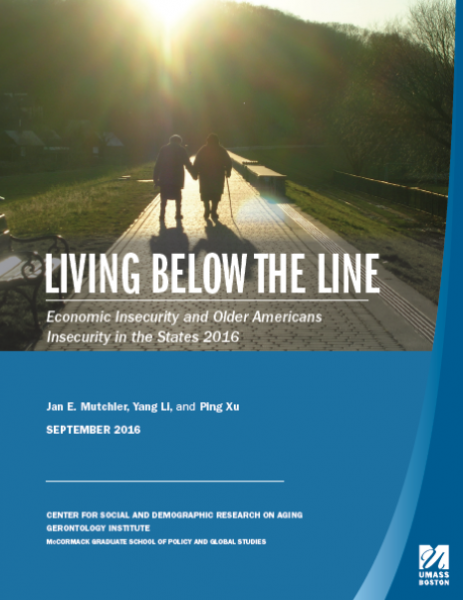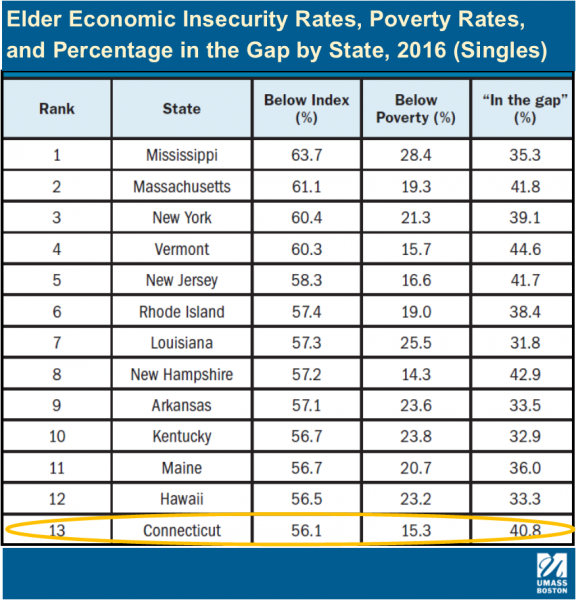Economic Insecurity Plagues More Than Half of Single Seniors in CT, Report Finds
/More than half of single adults age 65 and older in Connecticut can’t afford food, housing or other basic necessities, based on their income. The “economic insecurity” of that population ranks Connecticut the 13th highest rate in the nation. In the neighboring states of Massachusetts, New York, and Rhode Island, the situation is even worse. Massachusetts, in fact, has the second highest rate in the nation. Nationwide, 53 percent of single older adults fall below the index’s target value. In Connecticut, the percentage is 56.1 percent.
The report, Living Below the Line: Economic Insecurity and Older Americans Insecurity in the States 2016, was published by the Center for Social and Demographic Research on Aging Publications at the University of Massachusetts Boston’s Gerontology Institute.
According to the report’s analysis, only about 15 percent of older Connecticut residents living alone fall below the poverty line, but 56.1 percent don’t make enough to live on, and often do not qualify for public assistance, because of the relatively high cost of living in the state. The gap, the report points out, is 40.8 percent of Connecticut’s single elderly, among the largest in the nation. Only four states have a larger percentage of that population below the index rate but above the poverty rate, reflecting the substantial economic insecurity in the state among the single elderly population.
The states with the largest percentage of single older adults situated below the index are Mississippi, Massachusetts, New York, Vermont, New Jersey, Rhode Island, Louisiana, New Hampshire, Arkansas, Kentucky, Maine, and Hawaii.
The report notes that “Northeastern states at the top of the rankings are characterized first and foremost by high Elder Index values, reflecting the high cost of living in these locations, whereas Southern states at the top of the rankings are characterized predominantly by low incomes.”
In considering the economic insecurity of elderly couples, Connecticut fared better in the analysis, ranking 25th, midway among the states. Still, fully one-quarter (25%) of the state’s elderly couples were below the index level, although only 2.9 percent fell below the poverty rate for income.
Most older adults rely on Social Security benefits as a key component of their incomes, the report pointed out. The Social Security Administration estimates that Social Security benefits provide one-third of all income received by older adults, and that lower-income elders are especially reliant on Social Security. The UMass-Boston analysis indicated that on average, half of older adults who live below the Elder Index rely on Social Security for at least 90 percent of their incomes. In Connecticut, that percentage is 46.9 percent of single older adults and 45.2 percent of older couples.
The report concluded that “many older adults who live alone do not have the means to live with economic security. These older adults are of special concern, and policy and programs that address the concerns of single or couple elders living on their own— congregate and home-delivered meals, transportation, falls prevention, employment and training—should also be of special concern to federal, state and local governments.”
Noting that “Elder Economic Insecurity Rates demonstrate that a large proportion of every state’s independent older adults lack incomes that would allow them to escape the threat of poverty, to remain independent, and to age in their own homes,” the analysis implored that “each state must learn to recognize the economic security gap and those who fall into it.”
Developed by the Gerontology Institute at the University of Massachusetts Boston and Wider Opportunities for Women, and maintained through a partnership with the National Council on Aging (NCOA), the Elder Index defines economic security as the income level at which elders are able to cover basic and necessary living expenses and age in their homes, without relying on benefit programs, loans or gifts.






























